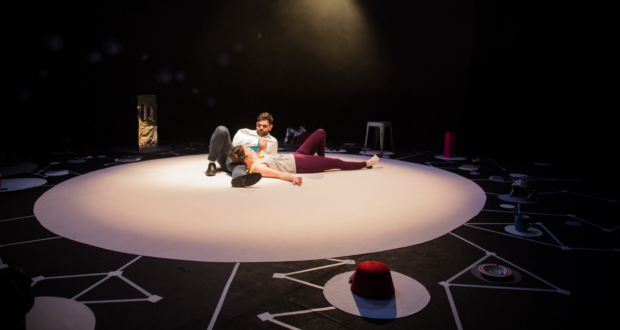A rather charming, humour filled show that may not quite reach great heights, but which takes on its subject matter with consideration and care. Summary
Rating
Good
A star is made up of two forces in conflict with each other. Beneath its bright and beautiful looking outer surface, inside it is one big mess. We know this because Tess explains it to Harry during one of their science-based conversations. It’s a very clever metaphor for the depression that she at first hides, only allowing him to see her bright exterior, full of quick wit and a passion for anything science. But of course, you can’t hide what’s inside forever, and as their relationship grows Tess’s depression becomes harder to conceal until, like the brightest star, it finally implodes on itself and extinguishes the light.
Writer and performer Rhiannon Neads is very much the bright star of Supernova. As Tess she gives a wonderful performance, switching smoothly from early humour to the darkness that begins to emit through her depression; cringing and recoiling at the slightest touch. There is a twinkle in her eye from the very opening scene as she and co-star Sam Swann nervously flirt with each other.
Her writing sparkles best when she merges the soft humour with what is surely a genuine love of the science Tess is obsessed with. It tell us instantly that here are two people on similar wavelengths, aided by the wonderful opening costumes; Neads as an astronaut whilst Swann is the eleventh Doctor Who (although his sonic screwdriver is from number ten as Tess quickly points out!). We are charmingly taken through their growing relationship as their worlds collide and merge. But beneath the laughter there are already signs of what lurks beneath; her awkwardness at taking compliments, an unwillingness to go out, not wanting to be around other people – all classic signs of depression. For Harry it becomes harder and harder to know what to do, what to say until, like every bright star, their relationship turns supernova and collapses in on itself.
There is some interesting design on show as well, not just those opening outfits of astronauts and The Doctor. The stage is cleverly laid out, although risks going unnoticed in the Omnibus’ space as sightlines to the ground are limited; but a closer inspection reveals a floor divided up into constellations, with important objects from the relationship placed in each of the twelve extremities. More obvious are the planets hanging at the rear of the stage, gently swaying and lighting up as inbetween scenes we see an explosion of lights.
But as good as all its elements are, Supernova for me ends up being one of those strange performances where you find yourself laughing or feeling sad in all the right places, you clap enthusiastically as the final lights go out, but then that’s it: it doesn’t leave any lasting impression. Its depictions of depression are well considered and tackled in a sympathetic manner, and it’s always great to see a play not scared to say that it isn’t always going to be happy ever after. But it’s maybe just a little too superficial, never really exploring deeper than what we see on the surface. It means that the play never quite manages to step over the line from being good to something that speaks to us and leaves an imprint in our minds long after the closing scenes.
However, whilst it may not be a show that will be remembered come the end of the year round-ups, it is very much filled with fine writing, soft humour and thoughtful consideration of its subject matter, which makes for an enjoyable evening. And there are more than enough clever science and science-fiction references to delight the geek in all of us.
Written by: Rhiannon Neads
Directed by: Jessica Dromgoole
Produced by: Stiff & Kitsch
Supernova plays at Omnibus Theatre until 13 May. Further information and bookings can be found here.
 Everything Theatre Reviews, interviews and news for theatre lovers, London and beyond
Everything Theatre Reviews, interviews and news for theatre lovers, London and beyond



